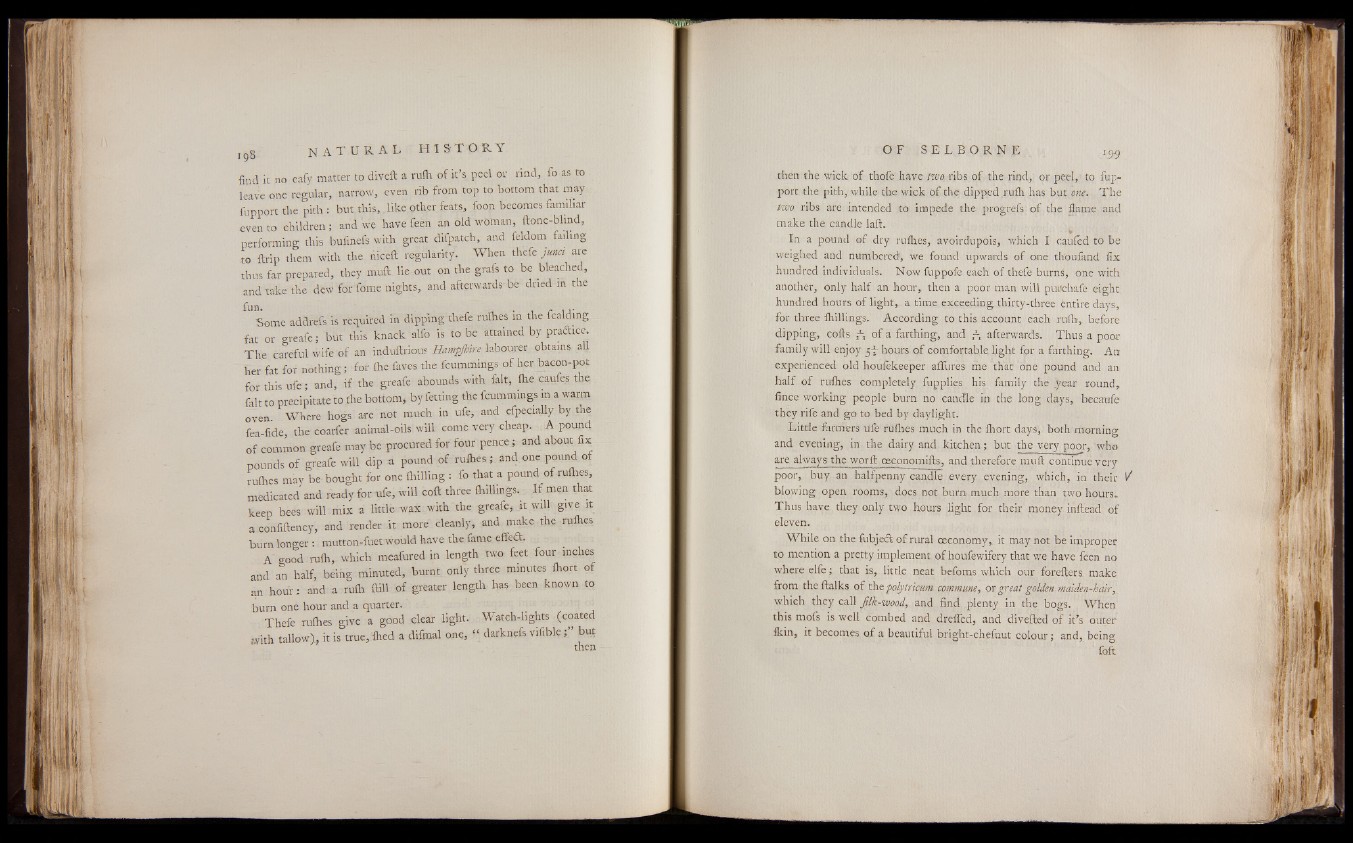
find it no eafy matter to diveft a ruth of it’s peel or rind, fo as to
leave one regular, narrow, even rib from top to bottom that may
fupport the pith : but this, dike other feats, Ron becomes familiar
even to children ; and we have feen an old woman, ftone-blind,
performing this bufinefs with great difpatch, and feldom failing
to ftrip them with the fiiceft regularity. When thefz junci are
thus far prepared, they muff lie-out on the grafs to be bleached,
and take the dew for Lome nights, and afterwards’be dried in the
Some addrefs is required in dipping thefe rulhes m the fcalding
fat or crreafe; but this knack alfo is to be attained by praftice.
The careful wife of an induftrious Hampjbiu labourer obtains all
her fat for nothing; for Ihe faves the fcummings of her bacon-pot
for this ufe ; and, if the greafe abounds with fait, Ihe caufesi the
fait to precipitate to.the bottom, by fetting the fcummings in a warm
oven. Where hogs are not much in ufe, and efpecially by the
fea-fide, the coarfer animal-oils will come very cheap. A pound
of common greafe may be procured for four pence; and about fix
pounds of greafe will dip a pound of rulhes; and one pound of
rulhes may be bought for one (hilling : fo that a pound of rufhes,
medicated and ready for ufe, will colt three (hillings, I f men that
keep bees will mix a little wax with the greafe, it will give it
a coniidency, and render it more cleanly, and make the rulhes
burn longer : mutton-fuet would have the fame efFedt.
A °ood rulh,- which meafured in length two feet four inches
and an half, being minuted, burnt only three minutes (hort of
an hour; and a rulh Hill of greater length has been known to
burn one hour and a quarter. • ‘
Thefe rulhes give a good clear light. Watch-lights (coated
with tallow), it is true, Ihed a difmal one, “ darknefs vi f ibl ebut
then
then the wick of thofe have two. ribs of. the rind, or peel, to fupport
the pith, while the wick of the dipped rulh has but one. The
two ribs are intended to impede the progrefs of the flame and
make the candle laft.
In a pound of dry rulhes, avoirdupois, which I cauled to be
weighed and numbered, we found upwards of one thoufand fix
hundred individuals. Now fuppofe each of thefe burns, one with
another, only half an hour, then a poor man will pui<chafe eight,
hundred hours of light, a time exceeding thirty-three Entire days,
for three (hillings. According to this account each rulh, before
dipping, colls of a farthing, and M afterwards. Thus a poor
family will enjoy M hours of comfortable, light for a farthing. An
experienced old houlekeeper allures me that one pound and an
half, of rulhes completely fupplie.s his family the .year round,
fince working people burn no candle in the long days, becaufe
they rife and go to bed by daylight.
Little farmers’ ufe rufhes much in the (hort days, both morning
and evening, in the dairy and kitchen; but the very poor, who
are, always the word osconnmifts, and therefore .mud continue very
poor, buy. an halfpenny candle every, evening, which, in their V
bloyving open rooms, does not burn much more than two hours.
Thus have they only two hours light for their money inftead of
eleven.
While on the fubjeff of rural oeeonomy, it may not be improper
to mention a pretty implement of houfewifery that we have feen no
where elfe; that is, little neat befoms which our forefters make
from theftalks of tht polytricum. commune, or great golden maideif-hair, ,
which they call filk-wood, and find plenty in the bogs. When
this mofs is well combed and drelfed, and divefted of it’s outer
fkin, it becomes of a beautiful bright-chelnut colour; and, being
foit